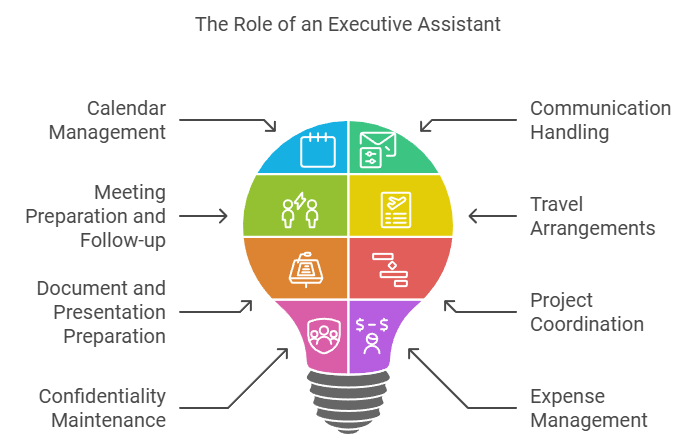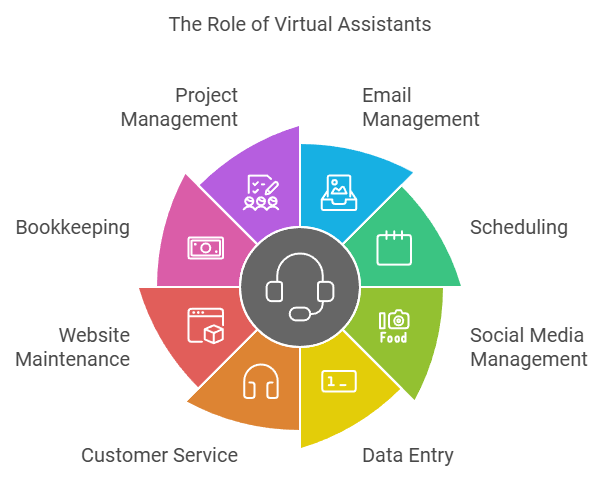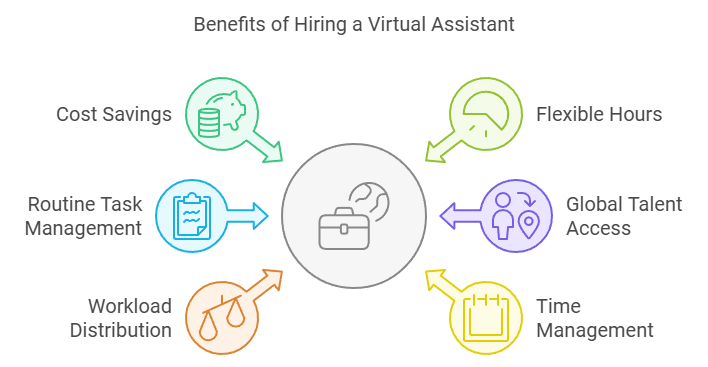Executive Assistant vs. Virtual Assistant, the debate between these two professionals goes on who to hire, or who would be suitable for business. Also, for many these two roles sounds similar, which is because they handle almost the same responsibilities, which is partially true.
An executive assistant assists the senior executives by being physically present in the office and grows as the company grows and is a salaried employee. Whereas a virtual assistant works from a remote location flexible to work for businesses, and clients on an hourly basis.
So, there is a clear difference between an executive assistant and a virtual assistant. Still, when you hire one again, their roles, the responsibilities they handle, and the type of tasks you delegate to them can confuse you.
So, today, let’s clear your confusion by differentiating between these two assistants, when you should hire one, and where to find the best one if you choose a VA.
What is an Executive Assistant?

Simply put, an executive assistant is an on-site worker hired on a part-time or full-time basis to support office senior executives, CEOs, or sometimes the team. These professionals’ main task is to ease the burden on the executive they assist.
Like any other on-site employee, these assistants enjoy all the facilities like a fixed salary, paid leaves, insurance and so on. Also, they are bound with a fix office hour.
Since an executive assistant most often supports senior employees, they do not require any high-end skills. But they must have great communication, organizational, time-management and interpersonal skills. With years of experience and expertise, these individuals become trusted employees and gradually help in critical decision-making, problem-solving, and sometimes in handling important projects.
However, their responsibilities mainly depend on the executives they work for. In general, an executive assistant handles several tasks, such as,
- Calendar Management
- Communication Handling
- Meeting Preparation and Follow-up
- Travel Arrangements
- Document and Presentation Preparation
- Project Coordination
- Confidentiality Maintenance
- Expense Management
- Office Tasks
What is a Virtual Assistant?

Virtual assistants, unlike any on-site employee, work from a remote location to support businesses or clients and are flexible with working hours and responsibilities. Businesses mainly outsource VAs to reduce the workload by handing over time-consuming or repetitive administrative tasks.
These remote helpers do not avail of any kind of paid leave or any additional benefit from the benefit, and companies do not need to pay any taxes on their behalf. Companies or individuals hire a VA either on a part-time, full-time, project or contract basis with an hourly rate or on their preferred option.
These remote professionals are self-motivated and learn new skills based on industry demand or client requirements. Since businesses are diverting to hiring VAs because of their cost and time-effectiveness, VAs now have a wider skill set and expertise. Their roles range from basic administrative support to web development, copywriting, e-commerce site management, and much more. Though it fully depend on the company what of VA they need.
Some common responsibilities of a virtual assistant are,
- Email management and correspondence
- Scheduling appointments and managing calendars
- Social media management and content creation
- Data entry and database management
- Customer service and support
- Website maintenance and basic updates
- Creating and managing spreadsheets and presentations
- Bookkeeping and basic accounting
- Project management and administrative support
- Research and information gathering
Key Differences Between Executive Assistant & Virtual Assistant
The term executive and virtual assistant may sound the same for many, but they come with different responsibilities, authority and facilities.
Executive helpers often stay on a higher level of authority, helping seniors or company owners with innovative ideas for business growth and decision-making. Whereas a virtual assistant work on their assigned tasks, and mostly do not interfere with the company’s decision-making process. However, these responsibilities and authority can change according to the business and on what position they want to hire.
For a better understanding, check out these core differences between an EA and a VA.
Work Environment
Executive assistants work in the office with the entire team by being physically present. They have their own desk and space where they work. The company provides computers, desks and other accessories.
On the other hand, virtual assistants work from a remote location and have their own home setup. They may have a dedicated workspace in their home with a complete setup of computers and other needed stuff. Also, a remote assistant does not necessarily need to work from their home; they may work while on vacation beside a beach, enjoying the view.
Skill Specialization
When it comes to skill or expertise, an EA and VA generally possess basic skills such as data entry, time management, organizational, communication skills, and so on. But if their responsibilities and roles are higher level, they come with a broader skill set.
For example, if an executive assistant require to handle projects, meeting with clients, or handle finance, they must have project management skill, or accounting knowledge.
The same goes for a VA. There are diverse types of virtual assistant, and each comes with their specific skills. Some may be expert in bookkeeping and, hence, handle their client’s bookkeeping accounts. Other skilled in customer support.
Here, a significant difference is that executive assistants most often do not focus on learning new knowledge or growing their expertise. But virtual assistants continuously stay updated with industry trends, and train themselves with newer skills.
Relevant Content: Administrative vs. Virtual Assistant
Primary Focus
The primary focus of an executive helper is on directly supporting one or more executives. They deeply integrate into an executive’s daily operations and strategic aspects. Moreover, the EA often acts as a gatekeeper, managing access to the executive and prioritizing what issues require attention. Also, the EA better understands the organization’s operations, executive preferences, and business needs.
On the contrary, a VA’s primary focus is providing remote administrative support for various tasks that may not necessarily require close physical supervision of the team or the executives. VAs often handle diverse tasks across multiple clients or departments. They must be adaptable and capable of managing different administrative and creative tasks. Their roles are often more flexible and not tied to a specific executive or location.
Cost

The average salary for an Executive Assistant in the U.S. typically ranges from approximately $50,000 to $80,000 per year. This is a rough estimate that can be lower or higher based on the EA’s expertise, company and location.
Virtual Assistants earn between $10 and $30 per hour, translating to roughly $20,000 to $60,000 annually. This depends on how many clients they work for and how many hours. Also, industry-specific VA can earn much more.
Scalability
Executive Assistants (EAs) usually have a fixed set role, working closely with specific bosses or teams. Their scalability is often limited. They can take on more tasks or support more people as needed. But their role grows mainly through deeper involvement with the same company. Since they work in an office, their ability to take on more or different work depends on what their bosses and the company need.
On the other hand, Virtual Assistants (VAs) can easily scale up their work because they’re not tied to one place or team. They can pick up more hours or offer different services as demand grows. This makes it much easier for them to expand their business without being limited by where they are or the need for an office. This helps businesses to hire only in peak hours or peak seasons, and when the task is done, they no longer need to continue.
Flexibility
Executive Assistants (EAs) usually have less flexibility in their jobs. They work closely with specific bosses and often need to be in the office during regular business hours. Their tasks are directly tied to the needs of the executives they support, which means they might not have the freedom to change their schedules or work from different locations as much as VAs do.
Virtual Assistants (VAs), on the other hand, have a lot of flexibility because they work online. This means they can work with different clients from all over the place at almost any time they choose. They can adjust their hours to fit their lifestyle or to match the time zone of their clients. VAs can also offer various services depending on what they’re good at and what their clients need.
Communication and Team Collaboration
EAs are like the hub of communication in an office. They work closely with executives and other teams. The EA make sure everyone is on the same page. They’re really good at handling face-to-face interactions and managing sensitive information carefully. EAs help teams work smoothly, ensuring meetings are set and everyone knows what’s happening next. They understand people and manage different personalities, especially in busy or stressful times.
VAs, on the other hand, handle their communication mostly online. Since they’re not in the office, they use emails, chat messages, and video calls to stay connected with teams and clients. They need to be super clear and professional in their written messages and make an extra effort to keep everyone updated since they can’t just walk over and talk to someone. VAs rely a lot on technology to help them keep track of tasks and collaborate with others from afar.
Onboarding and Hiring
The hiring and onboarding processes of EA and VA are different.
When you hire an Executive Assistant, there are a few rounds of interviews because these assistants work closely with top executives and often handle sensitive info. Once hired, an EA goes through an in-depth orientation. The HR department tells everything from the company’s policies to the executives’ preferences and the everyday tools they’ll use. They also meet the team members they’ll be working with closely.
For Virtual Assistants, the hiring focus is more on whether they can handle working remotely and juggle various tasks effectively. Companies assess their tech skill, how they can manage project independently and how they communicate. The entire interview happen online. When onboarding company may give some training or no, and provide some tools. Also, they share how they report progress and set up schedule when to work for how many hours.
Benefits of Hiring an Executive Assistant
An executive assistant is not a new term in business. These professionals have been in the industry for years and have worked continuously with senior executives. They are more trustworthy and work for the company’s growth. Here are more benefits of an executive assistant.
- An Executive Assistant keeps everything organized, from your daily tasks to your most important meetings, so you can focus on showing up and doing your best.
- They manage your time like a pro, helping you sort through what needs your attention now and what can wait, keeping you on track without overwhelming you.
- You’ll never miss a beat with them around because they make sure all communications are clear and reach the right people at the right time.
- Your productivity gets a boost since they handle all the admin tasks, freeing you to concentrate on strategic planning and leadership roles.
- You can trust them with the most private information; they’re a vault, ensuring that sensitive details are kept confidential.
- Have an event to plan? They’ll handle every aspect, ensuring flawless execution of each event, whether big or small.
Benefits of Hiring a Virtual Assistant

Today, companies are more interested in hiring a virtual assistant because of their cost-effectiveness and global talent pool accessibility. Here are more benefits you can avail of by hiring a virtual assistant.
- It saves money because you don’t need extra office space or equipment; they work from wherever they are.
- You can adjust their hours as needed, so if things get busy or slow down, you’re covered without the hassle of hiring or laying off employees.
- They take care of the routine tasks, which frees up everyone else to focus on the bigger projects or creative thinking.
- Since virtual assistants work remotely, you can find great people from all over the world, which is perfect when you need someone with a specific skill.
- It helps prevent your current team from getting too stressed by spreading out the work more evenly.
- If things unexpectedly get busy, a Virtual Assistant can jump right in and help manage the extra workload.
- They can help everyone manage their time better by taking on those tasks that eat up a lot of the day.
- Virtual Assistants often use neat tools and tricks from their experience with different clients, which can be a big plus for your business.
When to Choose an Executive Assistant vs. Virtual Assistant
Large businesses most often hire executive assistants, as their senior executives or team members juggle a ton of work. On the other hand, small businesses or entrepreneurs hire VAs because of limited resources.
However, this fully depend on what you need. Here is a checklist for you to understand better who to hire.
Choose an Executive Assistant if:
- You need on-site support for sensitive or high-stakes tasks.
- Close, constant interaction with senior leadership is required.
- Handling confidential information.
- High-level meeting coordination and follow-up are needed.
- The executive’s schedule demands detailed planning and management.
- Personal attendance to guests and stakeholders is beneficial.
- Daily office management and presence are critical.
- Quick adaptation to office dynamics is valued.
- Dedicated support for travel planning is necessary.
- Physical representation at events or in-office is preferred.
Choose a Virtual Assistant if:
- You need cost-effective, scalable support.
- Tasks involve digital tools, online processes, or remote-friendly workflows.
- You’re looking to expand business operations without hiring full-time staff.
- You require flexibility in working hours to cover different time zones.
- You want to outsource routine administrative tasks to focus on core activities.
- Your projects are short-term or vary in intensity, requiring adjustable support levels.
- You need expertise in specific areas like social media, content creation, or customer support.
- Overhead reduction is a priority, minimizing office space and equipment costs.
- You seek a quick setup and onboarding process to get support operational rapidly.
- You prefer managing tasks and communications through digital platforms.
Why Choose Us as Your Virtual Assistant Provider
Lets say you decided to hire a virtual assistant, because you find this option more reliable. Now where can you find the suitable VA for you who will have all the skill sets, and can support you fully. For this, you first need to create a detailed job posting, share in different online platforms, screen CVs, conduct interviews and so more things.
But at HVA, all you need to contact us, share your need, get your VA and start working. Is it sound so simple and easy? Yes, at HVA, we understand and value your precious time, and want the best for you. Having a expert and experienced virtual assistant team, we serve diverse industry and niche. So, no matter what type or industry business you have we have the perfect solution for you.So, contact us today to get your VA.

